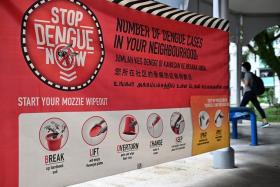5-year high in dengue cases at the start of year
More than 2,000 dengue cases have been reported since the start of 2024 – the highest number recorded in at least five years for the corresponding period.
It is more than one-fifth of all dengue infections in 2023.
The National Environment Agency (NEA) told The Straits Times that the continued rise in cases – numbers have gone up over nine consecutive weeks – is “a big concern”, but it is still too early to say if it will result in a major outbreak in 2024.
There were 494 infections in the week ending Feb 3. Since then, another 185 cases have been reported as at Feb 6, 11am.
There are currently 96 active dengue clusters across the island. The cluster in Ang Mo Kio Avenues 1 and 3 and Ang Mo Kio Street 31 has had the most infections in the past fortnight at 48, while the cluster in Boon Lay is the largest with 276 infections. Block 303 Ang Mo Kio Avenue 1 accounted for 19 cases.
NEA said this is one cluster where it has observed a fast rate of dengue transmission.
Its spokesman said the rise in cases is likely driven by intense dengue transmission in areas with a high Aedes mosquito population.
This excludes places where the agency has been releasing male Wolbachia mosquitoes, such as Tampines and Choa Chu Kang, which has resulted in an 80 per cent reduction in the Aedes mosquito population in those areas.
The male Wolbachia mosquitoes are sterile, so when they mate with the females, the mosquitoes do not reproduce, thus reducing the population.
People living in areas where Wolbachia mosquitoes have been released for at least one year are “up to 77 per cent less likely to be infected with dengue”, said NEA, citing data from 2019 to 2022.
This is why it has decided to expand the project in 2024 to five more locations, from the original eight. The new locations, chosen based on historical dengue risk, are: Bukit Merah-Telok Blangah, Clementi-West Coast, Commonwealth, Holland and Marine Parade-Mountbatten.
This will add another 70,000 households to the areas covered by the project, for a total of 480,000 households, representing 35 per cent of homes here.
Dengue cases here tend to peak around the middle of the year.
Get The New Paper on your phone with the free TNP app. Download from the Apple App Store or Google Play Store now

